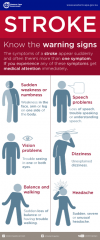Stroke awareness

Anyone is at risk of having a stroke. You can change unhealthy habits like smoking, being overweight or not exercising enough, reducing your chances of suffering a stroke.
What is a stroke?
A stroke occurs when blood vessels carrying oxygen and nutrients to the brain suddenly become blocked or burst. When this happens, part of the brain can’t get the blood (and oxygen) it needs, so the affected brain cells die.
This can result in parts of the brain being permanently damaged.
Signs and symptoms
Knowing the signs of a stroke and seeking immediate medical help can improve the outcome of the stroke. The symptoms of stroke appear suddenly and often there's more than one symptom at the same time.
The symptoms of stroke include:
- Sudden weakness or numbness in the face, arm or leg on one side of the body.
- Sudden confusion.
- Sudden loss of speech, or trouble speaking or understanding speech.
- Sudden loss of vision.
- Sudden dizziness, loss of balance or trouble with walking.
- Sudden severe or unusual headache.
Act F-A-S-T
FAST is a simple way to remember the signs of a stroke and that it’s important to seek medical help urgently
- F – Face drooping
- A – Arm weakness
- S – Speech difficulty
- T – Time to call emergency medical services
FACE: ask the person to show their teeth or smile and see if one side of the face droops or doesn't move as well as the other side does.
ARMS: ask the person to lift both arms up and keep them up and see if one arm doesn't move or drifts downward when extended.
SPEECH: ask the person to repeat a short sentence (e.g. “it is a sunny day in Cape Town”) and see if the person uses the correct words without slurring.
TIME: make a careful note of the time of onset of symptoms and call for help urgently if you spot any one of these signs.
Strokes, causes, effects and prevention
There are 4 kids of stroke:
- Ischemic strokes (caused by narrowing or blocking of arteries to the brain).
- Hemorrhagic strokes (caused by blood vessels in and around the brain bursting or leaking).
- Transient ischemic attacks (TIAs), also known as mini-strokes (occurs when blood flow to part of the brain stops for a short period of time).
- Amaurosis Fugax (occurs when a blood clot has become lodged in the blood vessel at the back of the eye, causing loss of vision).
Potential causes of a stroke
There are various risk factors which contribute to a stroke, such as hereditary (family history) factors as well as lifestyle habits. While some risk factors, such as family history can’t be changed – the following risk factors can be changed or managed:
- High blood pressure.
- Atrial fibrillation (an irregular heartbeat).
- High blood cholesterol.
- Smoking.
- Physical inactivity.
- Poor diet and excessive alcohol intake.
- Being overweight.
- Diabetes.
- Use of illegal drugs such as cocaine and crystal methamphetamine (tik).
Effects of a stroke
The brain is an extremely complex organ that controls various body functions. If a stroke occurs and blood flow can't reach the region that controls a particular body function, that part of the body won't work as it should. The consequences of a stroke can include:
- Paralysis on one or both sides of the body.
- Vision problems.
- Speech/language problems – difficulties in speaking, reading, writing or understanding speech).
- Memory problems.
- Difficulties with swallowing/eating.
- Depression and/or emotional issues.
- Incontinence (trouble controlling bowels/bladder).
How to prevent a stroke
Preventative measures and early detection are essential to help reduce the risk of a stroke and the effects which it may have. The following health tips may reduce your risk:
- Go for regular check-ups.
- Eat healthy, balanced meals.
- Quit smoking.
- Increase your physical activity.
- Find ways to lower your stress levels.
Life after a stroke
Having a stroke can be a life changing experience but remember almost all stroke survivors will recover to some extent. If you had a stroke you can go on to lead a normal meaningful life with the correct rehabilitation.
You need to understand that it might be a long road to recovery and you might not regain your capabilities to the same level as before the stroke. You can recover your independence and become productive again. Rehabilitation will be a big part of your recovery and will help you to adapt to your new physical limitations (if you have any).
Read other stroke survivors share their stories.
You can contact the following facilities to assist with rehabilitation:
In-patient support (A patient who stays in hospital while receiving treatment):
Western Cape Rehabilitation Centre: Tel: 021 370 2300
Out-patient support (A patient who receives treatment without staying overnight):
Groote Schuur Hospital: Tel: 021 404 9111
Tygerberg Hospital: Tel: 021 938 4911
You can consult the Western Cape directory for patient support for the contact details of other organisations in your area that will be able to help you. Alternatively, you can visit the Heart and Stroke Foundation website, or email: heart@heartfoundation.co.za.
